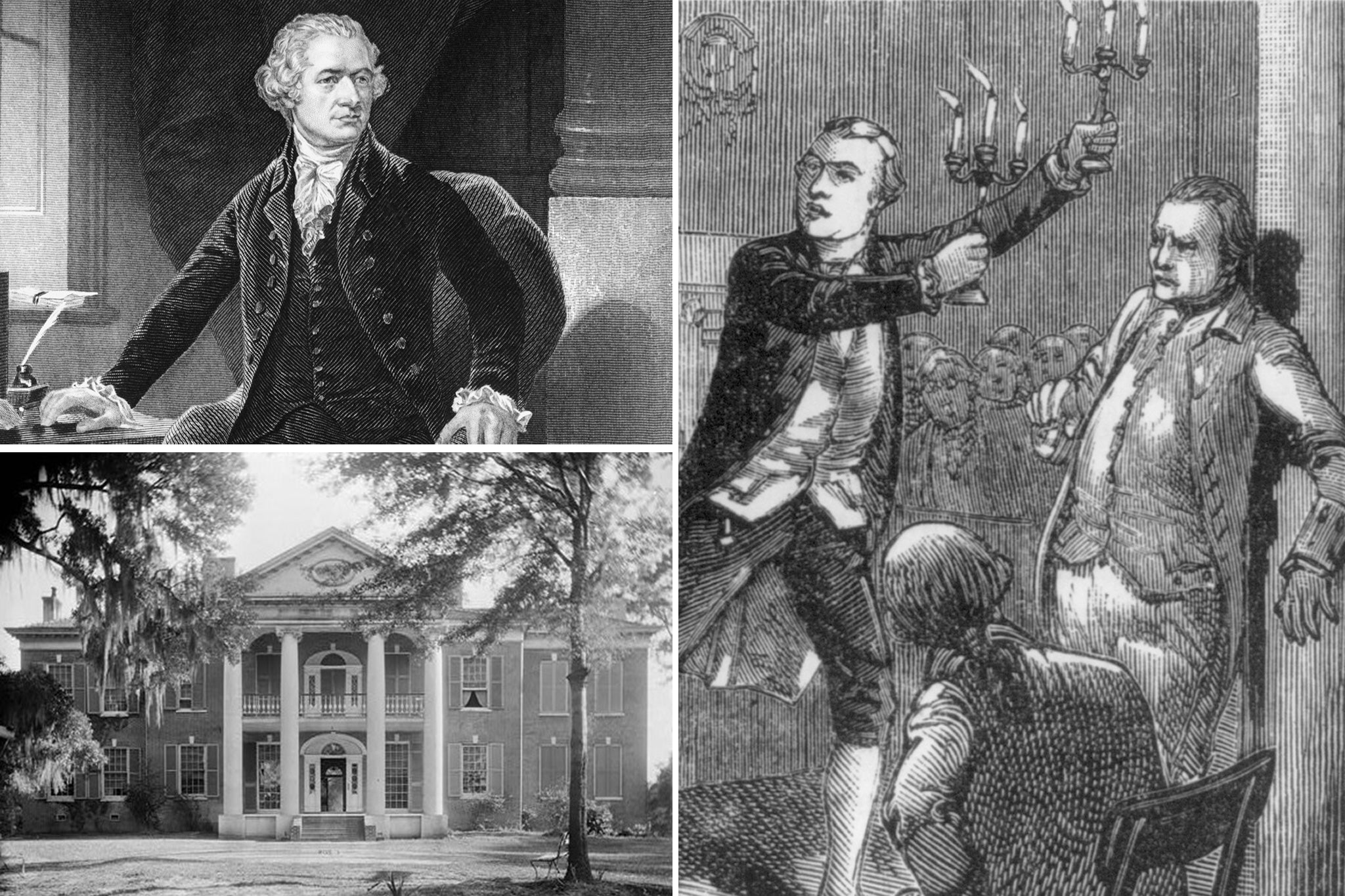The untold story of the 200-year old Manhattan Well Murder
22-year old Elma Sands was found dead at the bottom of a well in Manhattan in 1800. A new podcast starring Allison Williams and Tony Goldwyn tells the remakarkable tale of her death and the ensuing murder trial of her lover. Clémence Michallon reports


Your support helps us to tell the story
From reproductive rights to climate change to Big Tech, The Independent is on the ground when the story is developing. Whether it's investigating the financials of Elon Musk's pro-Trump PAC or producing our latest documentary, 'The A Word', which shines a light on the American women fighting for reproductive rights, we know how important it is to parse out the facts from the messaging.
At such a critical moment in US history, we need reporters on the ground. Your donation allows us to keep sending journalists to speak to both sides of the story.
The Independent is trusted by Americans across the entire political spectrum. And unlike many other quality news outlets, we choose not to lock Americans out of our reporting and analysis with paywalls. We believe quality journalism should be available to everyone, paid for by those who can afford it.
Your support makes all the difference.The infamous Manhattan Well Murder became the first sensationalized US murder trial in 1800, and a new podcast finally focuses on the victim at its center: Elma Sands, a 22-year-old found dead at the bottom of a well.
Levi Weeks, Sands’s lover, was tried for (and acquitted of) her murder. His legal team comprised the most famous pair of legal rivals in US history, Alexander Hamilton and Aaron Burr.
In the centuries since, the story of Sands’s death has been explored throughout pop culture. There was Gore Vidal’s 1973 novel Burr, and a 1978 episode of CBS Radio Mystery Theater. In 1989, Estelle Fox Kleiger published The Trial of Levi Weeks: Or The Manhattan Well Mystery. The 2013 nonfiction book Duel with the Devil was an examination of the case by writer and historian Paul Collins.
And then there was the biggest cultural reference of all: Sands’s murder case was mentioned in the musical Hamilton, during the hit song “Non-Stop”: “Our client Levi Weeks is innocent. Call your first witness. That’s all you had to say,” Burr admonishes Hamilton.
A new podcast reframes Sands’s story. Erased: The Murder of Elma Sands, starring Get Out’s Allison Williams as Catherine Ring, Sands’s cousin, and Scandal’s Tony Goldwyn as Hamilton, recreates and dramatizes the trial in modernized language, giving listeners a vivid picture of the proceedings. The show places an emphasis on the often callous treatment of Sands as a defendant, and on Ring’s role defending her cousin’s character.
In an interview with The Independent, Williams said that exploring Sands’ trial echoed “the same lesson I keep learning about the criminal justice system” – that it is “deeply broken and deeply intractable and deeply unfair and deeply American.”
Born Gulielma Elmore Sands, Sands disappeared on 22 December 1799. Her body was found 11 days later. Weeks, who had been romantically involved with Sands, quickly emerged as a suspect. On the day of her disappearance, Sands had told her cousin Ring that she and Weeks had secretly become engaged, and that they had plans to elope. Weeks eventually denied that he and Sands were planning to wed.
It’s an understandable instinct to wonder whether Weeks’s acquittal was justified. In the centuries since he walked free, some have denounced the infamy that followed him in New York, while others have deplored the glory and respect he found after relocating in Natchez, Mississippi, and working as an architect. (The Auburn mansion, which he designed, is now a National Historic Landmark.) Some have looked at potential other suspects; in his book, Collins looks at Richard Croucher, another boarder (and prosecution witness) who was later convicted of raping a 13-year-old.
Erased hits all those marks, and is in conversation with that existing material, but its aim differs. Through court reenactments, the six-episode series highlights the flaws of Weeks’s trial as a truth-finding process. The defense, for example, is heard admonishing Sands for having had premarital sex, describing her as “risky and promiscuous”, and arguing that those alleged characteristics mean she is more likely to have died by suidice than murder. This, despite the fact that at the time, it was “nearly unheard of to drown oneself in a well,” Allison Flom, the podcast’s creator and host, narrates on the show, pondering: “Are we to believe Elma pioneered a new method of suicide?” And if so, she asks, how may we explain the “bruises and wounds” found on her body?

Flom first heard about Elma Sands while working as a tour guide in New York City. The well where Sands’s remains were discovered still exists, and can currently be found, incongruously, inside a COS clothing store at 129 Spring Street, in the middle of fashionable Soho.
“This well is not landmarked,” Flom says in a phone call with The Independent. “That, to me, means it’s under constant threat, because New York evolves all the time.” Sands’s story appealed to her, she says, because it “perfectly illuminates the completely broken foundation of the justice system that we know today.”
Flom, the daughter of music producer, podcaster, and criminal justice reform advocate Jason Flom, relied on historical records and books including Collins’s and Kleiger’s or her research. When Flom told Williams, who she’d first met at an event years ago, about the trial, the actor was convinced to do the project from day one.
“I admired [Flom’s] obsession with reviving womens’ stories that have been lost to history and I wanted to be part of helping her with that mission,” Williams told The Independent in an email. “The more I learned about Elma’s story, the more I understood Allison’s urgency to reintroduce her to the world.”
Williams worked as an executive producer on the show in addition to lending her voice to Ring. Ring, a Quaker woman, “went against all of her upbringing and her beliefs to make noise” about Sands’s murder, Flom says on our call.
“Catherine showed immense bravery by putting her cousin’s dead body on public display,” Williams said. “She went against the tenets of her own Quaker faith in her attempt to offset – even slightly – the ridiculously lopsided power dynamic. And I’m thrilled that all these years later, we can shine the spotlight she wanted on the unfairness of the entire system.”

The stature of the men who crop up in the murder case – Hamilton and Burr, really? Working on a case as part of the same team, a mere four years before the latter killed the former in a duel? – means that it’s shockingly easy for Sands to fade into the background whenever her murder is discussed.
This, after all, is not the story of how the mystery of Elma Sands’s death was solved (no other suspect was ever charged after Weeks’s acquittal). But after years of focusing on Weeks’ infamy and Hamilton and Burr’s legal collaboration, Erased tells the story of Sands and Ring, and how the criminal justice system of the time failed to establish a definitive answer as to what happened to Sands.
“This story is a brilliant illustration of how the court of public opinion can have an outsized and deeply destructive impact on the judicial process,” Goldwyn tells The Independent in an email. “Elma Sands was painted very unfairly and justice almost surely was not done.”
Sands’s murder trial occupies an important place in legal history, not only because of its protagonists, but also because it is the first US murder trial for which there is a recorded transcript. As he learned about the case, Goldwyn says he “became increasingly disturbed by the skill with which Hamilton and Burr defended their client and deflected blame for the murder away from him.”
“Hamilton has always been a hero of mine, despite his personal foibles,” Goldwyn adds in his email. “I must admit that this case has cast a bit of a shadow on my hero worship – even though he was skillfully doing his job.”

Williams also felt her perception shift, though she had “pretty complicated feelings about [Burr and Hamilton] already.” The duo had both immense privilege and responsibility in shaping not just a new nation but also its legal system, she said—and the Sands murder trial is, to her, “a perfect example of where they fell short.”
“If the people with the most power at this trial had decided to be change agents, progressive, or creative, they might have baked in more good values and fairness into our system,” she said. “Instead, they went with what had been comfortable for men in their class for all time.”
She hopes the show will introduce some of those values to new minds. “Who knows,” she said, “maybe the people who are going to repair this broken system on a macro level just haven’t been introduced to these concepts yet.”
Erased: The Murder of Elma Sands airs on Lava for Good Network, Apple+, Amazon and iHeartRadio, and other platforms on 18 October



Join our commenting forum
Join thought-provoking conversations, follow other Independent readers and see their replies
Comments